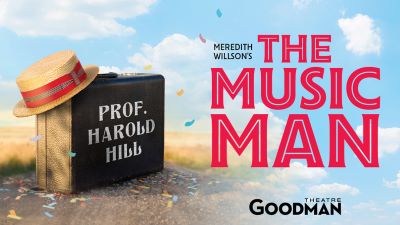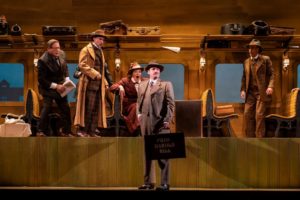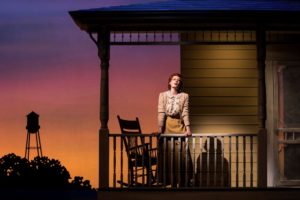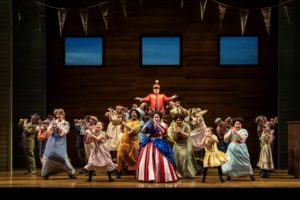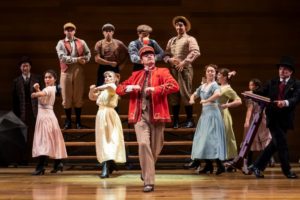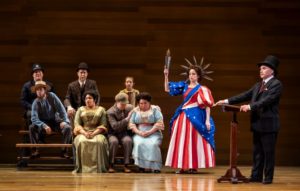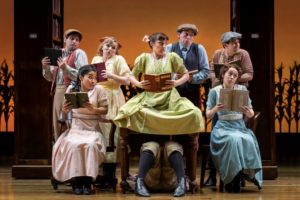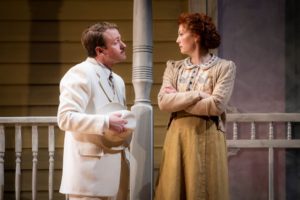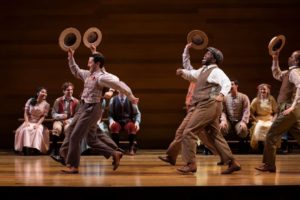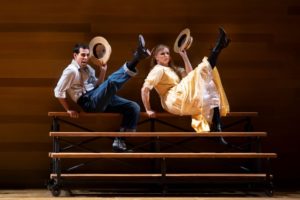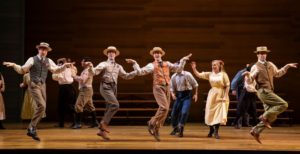MAN, OH MUSIC MAN
If ever a show spelled out summer, it’s Meredith Willson’s 1957 masterpiece The Music Man. Throughout the rollicking story, the title character exudes sunny optimism, a flimflam that “Professor” Harold Hill wants to believe as much as the suckers who take it in. His buoyant drive fits the season like a picnic. It’s 150 minutes of bumptious confidence triumphing over small-town suspicion.
Of course Hill is a 1912 confidence man who hornswaggles a ragtag band into playing music, a shy boy into speaking, a town into believing in itself, and a librarian into love. The sturdy story is perfectly embedded in a very particular time capsule as Willson meticulously employs, with glorious abandon, assorted slang, celebrities and colorful metaphors from the era and the state.
Helping this miracle worker Hill cast his spell, Willson gives him such powerful persuasion as “Seventy-Six Trombones” and “Trouble,” the famous snake-oil sermon. By the musical’s end Hill has sold far more than he knows, a passel of dreams for River City to grow on. It’s a great formula: As in The Rainmaker, a mysterious stranger comes to town and changes everyone for the best, including himself when he realizes that what he gives is worth far more than what he sells. (The one misfire seems the rather abrupt endings for each act.)
Few shows strike such a shrewd balance between downhome decency and showbiz savvy. Because Music Man wears its songs on its sleeve, it can’t seem too slick or smooth. What matters is the tender loving care.
Crisp but never cold, there’s heart enough in Goodman Theatre’s well-budgeted production, the latest ingeniousness from make-believe magician Mary Zimmerman. Intimately homespun yet always knowing, her staging trusts the material, Willson’s fast-moving book, deceptively clever lyrics, and unimprovable melodies — and mainly gets them right.
The look, for instance: Contrasted with a very supple cyclorama, Daniel Ostling’s clever, flexible and detailed set pieces deliver Midwestern minimalism to create a richly nostalgic Iowa setting. Ana Kuzmanic’s fashionplate period costumes complete the illusion.
The human illusions are almost equally on target. Barbara Cook and Shirley Jones notwithstanding, Monica West nicely inhabits Marian’s rich mix of spinster standoffishness and idealistic yearning. Her “Till There Was You” is earned by every line she’s said before it. (The fact that she also sounds just like Cook in her perfect prime doesn’t hurt in the least either.)
Conning with unforced charm, Geoff Packard offers a Harold Hill who listens as much as hoodwinks. Like a good salesman he connects with the townsfolk, almost to the point of self-delusion. His charm seems fairly irresistible. What’s not so palpable is the warmth that’s meant to melt Marian and the chemistry that should follow. He doesn’t quite register what he’s giving up (his scam-artist independence) or what he’s getting (a passion more permanent than ripping off strangers). So there’s a hole in the heart of this respectful revival.
Like the leads, the supporting roles betray much more life than art, even the hammy stock roles like Ron E. Rain’s pompous, word-mangling mayor, Heidi Kettenring as his starched-blouse wife, Mary Ernster as Marian’s matchmaking mother (a role she played nine years ago at Marriott Lincolnshire), and Jonathan Butler-Duplessis as Hill’s gleeful trickster accomplice.
As the decent local kids whom Harold helps, Tommy Rivera-Vega and Milla Liss carry the romantic subplot with goofy grace. Special credit goes to winsome Carter Graf whose bashful, lisping Winthrop wails out “Gary, Indiana” as if he just made it up.
Finally, Dennis Jones’s unshowy choreography reminds us that these are unpretentious Iowans whooping it up as best they can: There’s no showoff hoofing here. The “Shipoopi” explodes with prewar pep, as well as frontier dancing worthy of Seven Brides for Seven Brothers. “Seventy-Six Trombones” and “The Wells Fargo Wagon” detonate with a palpable joy that makes the most difficult dancing seem a gift to perform as much as perceive. Jermaine Hill’s musical direction is assured, especially in the barbershop-quartet offerings.
In 2019, when the swindles are much more serious, we need this show like a fix. “Ya Got Trouble” indeed! But we’ve also got The Music Man!
photos by Liz Lauren
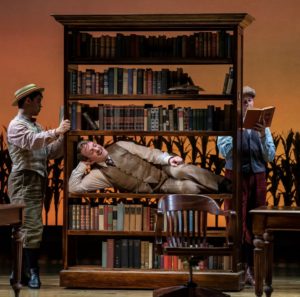 The Music Man
The Music Man
Goodman Theatre’s Albert Theatre
170 North Dearborn
ends on to August 4, 2019
EXTENDED to August 18, 2019
for tickets, call 312.443.3800
or visit Goodman Theatre
for more shows,
visit Theatre in Chicago
